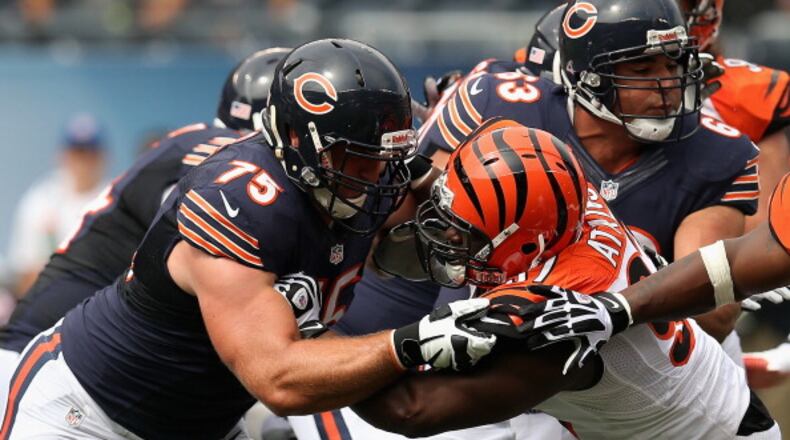BenJarvus Green-Ellis had a 5-yard touchdown run, but gained only 20 yards on his other 13 carries. Green-Ellis managed just 13 yards on 10 rushes on first down, with four of them going for negative yardage. Rookie Giovani Benard was effective but used sparingly, gaining 22 yards on only four attempts. Overall, the Bengals gained a mere 63 yards on 21 rushes (3.0 per), and if you take out a 14-yard reverse by wide receiver Marvin Jones, it was just 49 yards on 20 tries (2.5 per).
Passing offense: B+
Andy Dalton was 26-of-33 for 282 yards and two touchdowns, including 6-of-8 for 52 yards on third downs, five of which the team converted for first downs. Dalton completed passes to seven different receivers, including nine to A.J. Green for 162 yards, but he also threw two interceptions. One was Green’s fault after a perfect pass bounced off his hands, but the other pick gave the Bears a short field that they converted into the game’s first touchdown. The Bengals allowed only one sack, but it was key one on first down on their final offensive series.
Rushing defense: A
The Bengals held the explosive Matt Forte to just 50 yards on 19 carries (2.6 per), and that was after he gained 17 yards on his first two attempts. The Bears as a team gained just 81 yards on 28 attempts for an average of 2.9. Only three times last year did Mike Zimmer’s group hold an opponent to a lower average that that. If you take away scrambles by Chicago quarterback Jay Cutler, one of which went for 18 yards, the Bengals only allowed 65 yards on 25 called running plays.
Passing defense: C-
Through three quarters, Cutler was just 15-of-25 for 141 yards, but the Bengals allowed him to go 6-of-8 for 101 yards and a touchdown with the game on the line in the fourth quarter. The Bears were 6-of-14 on third downs, with four of those conversions coming on third-and-7 or longer, including a third-and-17 that kept alive their first touchdown drive of the game. Vontaze Burfict did have an interception, but the Bengals not only failed to record a sack — something they were able to accomplish in 15-of-16 games last year — they dropped coverage on a pair of Cutler scrambles, resulting in long gains of 38 and 30 yards.
Special teams: C
Mike Nugent put all four of his kickoffs in the end zone, three of which result in touchbacks to neutralize dangerous Chicago return man Devin Hester, who gained 31 yards on the one he brought out. And Kevin Huber completely negated Hester with four punts for a 48.3-yard average and, more importantly, a 48-yard net as Hester had two returns for 1 yard. But the Bengals had an illegal block that wiped out an Adam Jones 49-yard punt return and two personal foul penalties in punt coverage, one of which came at the end of the first half and put Chicago in position to kick a 58-yard field goal, which ultimately was the difference in the game.
Coaching: D
The decision to throw the ball late in the first half deep in their own end backfired. Had the Bengals run the ball on second down, the Bears likely would have just let the clock continue to run and not bothered using their final timeout. But the incomplete pass and clock stoppage gave them renewed hope and ultimately led to them kicking a 58-yard field goal that proved to be the difference in the game. Having to call three timeouts due to defensive confusion also proved costly as the Bengals had to play the final 8:06 without a way to stop the clock. And while the undisciplined, personal foul penalties were committed by players, the responsibility ultimately falls on the coaching staff.
About the Author
